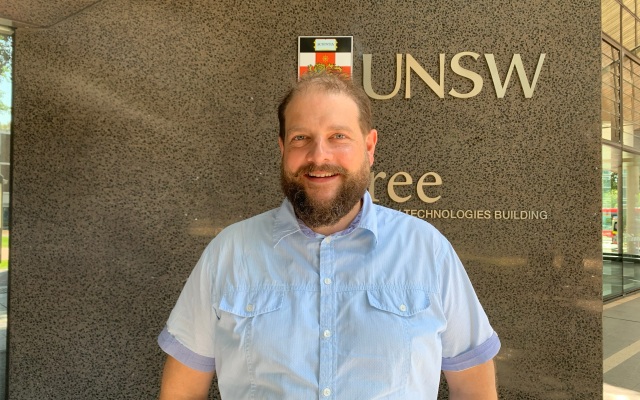
Dr Stuart Clark from UNSW Engineering is working with academics to make learning more accessible for students.
Dr Stuart Clark from UNSW Engineering’s School of Minerals and Energy Resources Engineering (MERE) is not just a geophysicist – he is also the Faculty’s Academic Disability Advisor. His goal is to create an equitable playing field in the classroom for students who have learning disabilities.
What does your role as Academic Disability Advisor involve?
I am the go-to contact between the Faculty’s Equity Diversity and Inclusion committee, the network of other Academic Disability Advisors across the university, and Equitable Learning Services at UNSW. I also work directly with academics to assist them with adjustment letters, special consideration forms or just how to generally make their courses more accessible, as well as backing up students who want extra support.
Why do you think this role important?
There are many ways to overcome disabilities just by adjusting the ways we’re assessing and teaching rather than saying, well, that’s just too difficult. We place obstacles because of the assumptions built into how we teach. As academics, we place those obstacles in the way of some students because we assume certain things about their abilities. So, if we challenge those assumptions and change them, then we’re still teaching just as effectively, if not more effectively – not only to those people who are differently-abled, but many other students will find it easier to understand the material better too. We are all different kinds of learners and we respond to different kinds of materials, so the more redundancy in the material and the more options there are for students, the better it is for everyone.
What are some of the behaviours you hope to change?
I think we have to change academics’ perceptions about accessibility. On major misconception is that the whole course needs to be adapting, for example - every PDF to ensure it’s fully accessible, change colour scales in all figures, add in closed captions to all their videos, and so on. The changes needed can seem overwhelming and it makes it hard to get started. We need to look for small changes we make that can also have the biggest impact.
For example, giving students the option to submit different types of assignments or making some exams take-home can reduce the unnecessary anxiety that can be associated with these exams. We academics are interested in testing students’ uptake of knowledge and not their exam performance – but we often confuse the two – and I want to challenge these kind of assumptions and get us thinking creatively about knowledge delivery and testing.
I also want to change students’ perceptions around the stigma of registering with the Equitable Learning Services – I would like to see students register and get their adjustments worked out without thinking that they can just cope and it’ll be alright. This will reduce the anxiety around assessments, flag to more academics the need to make some small adjustments to their courses as well as reduce the burden on the Special Considerations Unit come exams. We need to break down the stigma of having a disability and normalise it.
Why did you decide to take on this role?
I really wanted to give back to the broader UNSW community and it’s an issue I feel passionately about. I think everyone should have equal access to learning. I was also motivated at the time by a student who had vision impairment who was extremely intelligent but just engaged with learning differently. I can see in myself that we’re all differently abled, we all have different ways of engaging with knowledge and training our brains so we shouldn’t be biasing against some people based on our own one-dimensional view of ability.
Why do you think having an Equity, Diversity and Inclusion policy at UNSW is so important?
It’s important to have academics involved in the process when thinking about how we can make students’ lives easier and how to approach all kinds of issues around diversity and creativity. There have been significant developments that have come out of this committee to make engineering so much better, for example our focus on improving the engagement of women in engineering. I want to do the same for disability.
What are the top three things you’re working on this year?
- Providing more information to students and academics and facilitating a more streamlined process to engage academics in making adjustments to their courses.
- I aim to increase the number of optional assessment types so there’s more choice for students when it comes to exams.
- I want to create an onboarding pack for new academics.
